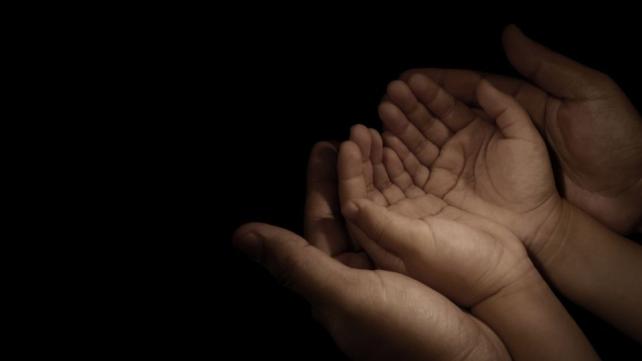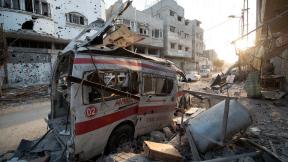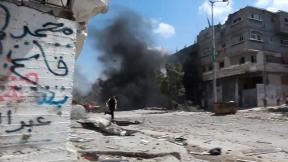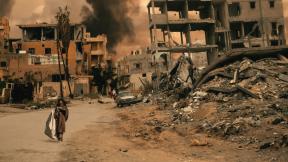
The hunger crisis in Gaza is catastrophic. It is a trial upon the believers. It is a hardship not just for those enduring it, but also for those on the sidelines watching the horrors unfold. This reality is particularly distressing for children and teens who may have seen the images or heard the discussion. Concerned parents worry about the psychological well-being of their children. In fact, the National Institute on Health studied children and adolescents viewing the images of Gaza on television and reported that they experience emotional distress like fear, anxiety, grief and helplessness. The feelings Muslim children bear is exacerbated by the genuine love and connectedness that comes with concern for a fellow Muslim. During any time of crisis, the only answer that will provide mental and spiritual relief is to turn to Allah. Parents can teach their children du’a to sustain them.
The people of Gaza are the ‘miskeen’ – because they have diminished financial resources, are needy and are in a state of hardship. This vulnerability makes those watching such extreme misfortune feel helpless. Muslims are taught we are all brothers and sisters to each other, and we want for our brother and sister what we want for ourselves. Hunger and starvation, especially from children is frightening and by extension, distressing. Children may not understand the political climate or the empathy fatigue that grips America and perpetrates inaction and complacency – but they are likely aware that this is the present situation.
Therefore, parents must guide and help their children navigate this crisis. Parents must reassure children to call on Allah no matter the catastrophic hardship. Allah always answers. In every prayer Muslims remind themselves that Allah listens to all those who praise Him. In the Holy Quran the believer is assured when Allah says;
When My servants ask you ˹O Prophet˺ about Me: I am truly near. I respond to one’s prayer when they call upon Me. So let them respond ˹with obedience˺ to Me and believe in Me, perhaps they will be guided ˹to the Right Way˺.
Surah Al Baqarah 2: 186
So, when those first feelings of helplessness appear, parents can help children understand that such feelings are manifestations of our own imperfections as human beings. We don’t have all the answers to every question or crisis faced. Therefore, children can be taught to make the short dua seeking forgiveness from Allah. Seeking forgiveness always makes us feel closer because we enter a state of sincerity, obedience and submission.
Subhan Allah, Allah maghfir lana ajzana, Allah maghfir lana ajzana.
(Glory be to Allah. Allah forgive us for our inability).
Parents can remind their children that trial and hardships are mentioned in the Holy Quran and something that every community has experienced. This helps to contextualize events, even such harsh and shocking events as the emergency hunger situation in Gaza. Extreme hardship is not new and experienced even by those divinely inspired.
Or do you think that you will enter Paradise while such [trial] has not yet come to you as came to those who passed on before you? They were touched by poverty and hardship and were shaken until [even their] messenger and those who believed with him said, “When is the help of Allah?” Unquestionably, the help of Allah is near.
Surah Al Baqarah 2:214
Children and adolescents worry about what is going to happen next in Gaza. Right now, the people are overwhelmed with hunger and starvation – what next? The imagination of the ‘what next’ creates the anxiety of future events that exacerbate the anxiety of the present condition. The children feel intense grief and sadness over what has already happened in Gaza. In the sayings and reports of Prophet Muhammad (SAW), parents can teach their children to make the following du’a during times of distress.
Oh Allah I seek refuge in you from alham (anxiety) and al-ha’zan (grief). And I seek refuge in you from inability and from laziness and I seek refuge in you from stinginess and cowardice and I seek refuge in you from the burden of debt and from being subjugated to man, from being at the mercy of someone else other than you Oh Allah.
Al-Bukhari 7/158
It is Allah who relieves man from oppression, injustice, starvation and war. There is no enemy state, army or nation that has more power than Allah. Man eludes himself that freedom comes from their own hand. Muslims knows that everything comes from Allah. Once children are reminded and understand that shocking hardships have happened in the past and that we are not always blessed with the ability or knowledge to ‘personally’ impact in an emotionally satisfying manner, then they can have complete submission to the decree of Allah. With that submission they are no longer at the emotional mercy of feeling overwhelmed by the actions of men. We work to help each other. Parents remind children that all things relate back to Allah, and we as human beings do what we can. Thus, the concept of tawakkul comes center stage and children learn and can apply putting their trust and relying on Allah.
"lā ḥawla wa lā quwwata illā billāh
There is no power and no strength except with Allah
Author bio: Mahasin D. Shamsid-Deen is the news curator and content manager for Muslim Network TV (MNTV) and contributing writer for Sound Vision. She holds a master’s degree in English writing and has worked as both a High School and College ESL Instructor and Writing Instructor for more than a decade. Mahasin has numerous published articles, books, essays and is a published playwright with three award winning stage plays. She is currently writing her dissertation for her doctoral degree.






Add new comment